Ruman Shana: The Archer Who Put Bangladesh on the Map
- Update Time : Sunday, June 29, 2025

Sports Desk:
When Mohammad Ruman Shana stepped onto the global archery stage, few expected a Bangladeshi to challenge the sport’s giants. But in 2019, he proved everyone wrong by clinching a bronze medal at the World Archery Championships, Bangladesh’s first-ever podium finish at the event. In that Cinderella run at Den Bosch, Netherlands, Shana toppled powerhouses like former world champions Kim Woojin and Mauro Nespoli to earn his place on the podium.
The achievement not only made history but also secured Bangladesh its first direct Olympic archery berth for the Tokyo Games. Riding that momentum, Shana captured gold at the Asia Cup in the Philippines later the same year, proving his world medal was no fluke.
In 2021, he added another feather to his cap by partnering with rising archer Diya Siddique to claim silver in the mixed team event at the Archery World Cup, Bangladesh’s best-ever finish at the competition. That year, World Archery named him the 2019 Breakthrough Athlete of the Year, recognising both his bronze and the path it cleared for Olympic qualification. At his peak, the boy from Khulna reached a world ranking of No. 10, firmly placing him among archery’s global elite.
CHAMPION ON HOME SOIL
Shana was instrumental in Bangladesh’s clean sweep of all ten archery gold medals at the 2019 South Asian Games—an unprecedented regional triumph that put the nation firmly on the archery map.
In 2023, he reclaimed the national crown by winning the Bangladesh National Archery Championship, sealing the men’s recurve title with a dominant 6–0 win in the final. (He and Diya took silver in the mixed-team event.) That title, his first in five years, reaffirmed Shana’s lasting dominance. He continues to represent Bangladesh Ansar, a leading domestic sports institution that regularly tops national medal tallies.
RISING FROM A DISORGANIZED SYSTEM
Archery in Bangladesh is still finding its footing, and when Shana picked up a bow in 2010, the sport lacked both structure and funding. His early training involved bamboo bows, built in a grassroots programme for youth.
A turning point came in 2018 with the appointment of German coach Martin Frederick, funded by the “Teer Go for Gold” initiative. Frederick brought structure, international exposure, and professional training. The impact was immediate: Bangladesh’s archers won 15 gold, 18 silver, and 10 bronze medals on the international stage in 2018–2019.
But even as Shana’s star rose, cracks remained. Despite being the country’s top archer, he received a monthly allowance of just ৳3,000 (around $35)—a sum he said was “barely enough to live on.” When Shana voiced his frustration, officials responded defensively. The federation’s secretary went so far as to claim Shana had “mental issues” and needed a psychiatrist, rather than addressing the real concerns he raised.
CHALLENGES AND A CROSSROADS
By 2023, after COVID-related disruptions and internal disputes, Shana’s form began to dip. He was briefly benched and banned for alleged disciplinary issues. Feeling pressured by restrictive federation rules and disrespected despite years of service, Shana made the shock decision to retire from the national team at just 28.
In a heartfelt letter, he questioned what he had earned after 14 years of dedication—feeling that even historic achievements hadn’t secured him recognition or meaningful reward.
In early 2025, the story took another turn. Ruman Shana, Bangladesh’s Olympic flag-bearer in archery, left the country with his wife, Diya Siddique, in search of better prospects in the United States. “We left… hoping for a better future,” Shana said.
If things don’t change, his story risks becoming a one-off—a symbol not of progress, but of missed opportunity.
THE WAY FORWARD: HITTING THE BULLSEYE
Despite the setbacks, Ruman Shana’s story is far from finished—and it holds valuable lessons for Bangladesh. He has expressed openness to returning, but only if real changes are made. His message is clear: talent alone isn’t enough—support systems matter.
First, athletes need secure livelihoods. Competitive stipends or sponsorships are essential for full-time training. Second, the country must retain top-tier coaching and upgrade training facilities. The Martin Frederick era showed what’s possible—replicating that success demands sustained investment.
Lastly, there must be a culture of recognition. Athletes need more than applause. National awards, job placements, and long-term financial backing show that the country truly values its heroes. While the private sector, like City Group’s “Teer” brand, stepped up to support Shana, the public sector must now play its part with equal commitment.
For an archer to aim for Olympic gold, they mustn’t fear what happens after the final arrow is released.
A LEGACY TO BUILD ON
Ruman Shana’s journey in archery, from a small village in Khulna to the world championship podium, is proof of what Bangladeshi talent can achieve when determination meets opportunity.
His story is a rallying cry: with the right support, more Rumans can rise. The nation owes him not just thanks, but change.



















